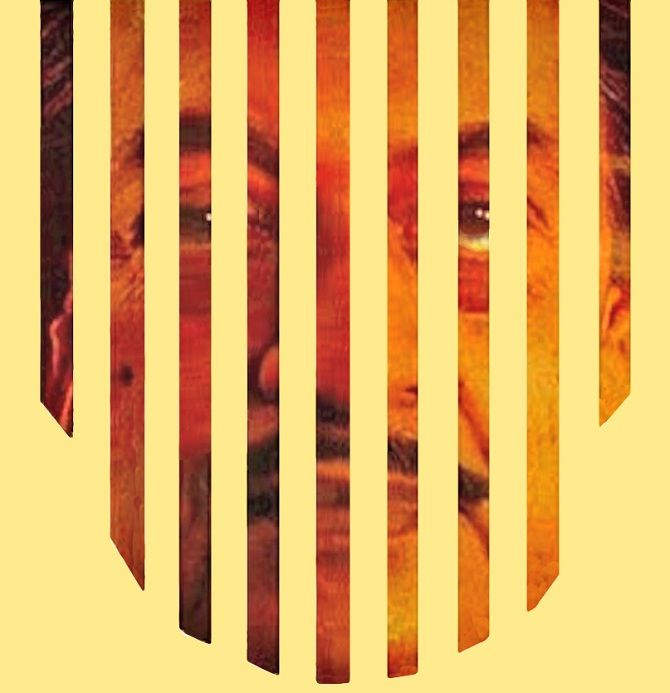It was supposed to be a panacea against corruption, leakage and a magic wand for financial inclusion.
But everywhere you look are people who enrolled, only to fall through the cracks again.
Rajendran Narayanan on why democracy at large is at stake in this debate that the government does not want us to have.

Much like Mitra's passport, Aadhaar seems to prove nothing for many in India.
Agantuk (The Stranger) was Satyajit Ray's last film.
The film revolves around the return of an old man, Manomohan Mitra, to India after 35 years.
Manmohan had spent all his life with Adivasis from across the world and has a take on civilisation and progress that is at odds with the popular urban narrative of it.
He claims to be the uncle of Anila and wants to spend a few days at her house in Kolkata. Anila's husband Sudheendra is highly suspicious of this stranger's identity.
Manomohan sees through Sudheendra's suspicion and gives his passport to Sudheendra to verify his 'identity'.
Sudheendra heaves a sigh of relief as he matches the name, the photograph, and the distinguishing mark.
Manomohan, on the contrary, debunks Sudheendra's conviction by saying 'The passport proves nothing' about 'identity'.
India is going through a curious phase where these questions are being codified and mapped through a 12-digit numeric equivalent called Aadhaar.
Let us look at what these mean from the lens of an Adivasi man called Xavier Ahir Minj in his 40s.
Xavier is a resident of Mahuatoli village in Champa panchayat of Mahudand block in Latehar district of Jharkhand. That's his residential identity.
He cannot stand straight and uses a sturdy stick as support.
He is visibly disabled and has a certificate issued in 2009 with his passport photograph stuck on it that 'proves' that he is more than 50 per cent disabled.
He is thus eligible to get disability pension from the state.
Despite numerous visits to the block office, an 18-km walk, he has still not started receiving his disability pension.
Identity as an NREGA worker: Xavier is listed as 'Jebiyar' Ahir in the NREGA Management Information System (MIS).
His job card, bank passbook, and his Aadhaar number have been taken away by a local contractor.
According to the MIS, he and his wife have collectively earned Rs 24,096 from the beginning of the last financial year.
However, they don't even know their job card number and neither has worked a single day.
They were angry upon learning that so much money has been siphoned off in their names.
On paper though, they are model NREGA workers because they've purportedly done close to 100 days of work in a year.
Identity in the Public Distribution System: Xavier has also been struggling to get rations under the PDS because he doesn't have his 'original' ration card, and the dealer refuses to acknowledge the photocopy.
Xavier's wife, Indo Devi, was shouted at by the ration dealer for not producing the original, and they have stopped getting rations ever since -- although the Jharkhand PDS Web site indicates otherwise.
An Aadhaar enrolment camp was conducted in his village a few years ago.
Since then Xavier owns an Aadhaar card.
Unaware of privacy concerns, he had given his Aadhaar number to a contractor, among others, perhaps paving the way for wages taken out in his name.
While he was asked to sign the consent form during enrolment, there has been no education or training on the uses, abuses, and privacy of this biometric authenticated number.
Not so long ago, Nandan Nilekani, the architect of the Aadhaar project, came up with a taxonomy of the people opposed to Aadhaar, two of the categories being 'rights-of-the-poor' advocates and 'Luddites' (those who are opposed to technological change).
Xavier doesn't belong to either of the camps.
He got an Aadhaar because he was told that once he gets his Aadhaar, all his problems would be solved.
However, all that has happened is Xavier resides in multiple databases with Aadhaar acting as the compass among his many so-called identities.
Nilekani's taxonomy may appear clever, but it indicates he is ill-informed about ground realities, and points to his techno-utopianism.
Also read: Whose Aadhar is it anyway?
- No Aadhaar ID? Poor children to remain hungry in Modi's bharat
- BPL women need Aadhaar for free LPG connections
- Holy cow! Cattle to get own Aadhaar cards
What is primarily required is political and administrative will for effective delivery of services and not merely a randomly generated unique 12-digit number to tag people.
Enrolment in Aadhaar itself is a shining example of the government's reach when there is political willingness. The sheer numbers in the Aadhaar database is testimony to that.
In Xavier's context, it is more important to have responsive and accountable field staff as opposed to more camps to get people into a database.
Is it better to have a fancy algorithm that solves a wrong problem or some sub-optimal technology that attempts to solve more relevant problems?
What is at stake is not efficiency, but democracy at large.
The proponents of the UIDAI project may dismiss Xavier's situation as anecdotal. They may desire an assessment of the scale of such travesties. But how many anecdotes are required to make the government pause and reflect?
The velocity of Aadhaar imposition has left no time for rigorous studies or debate in evaluating the costs and benefits of this coercive project.
Aadhaar was supposed to be a panacea against corruption and leakage and a magic wand for financial inclusion. But, Xavier stands tall, paradoxically so, as a counter-example to the claims made by Aadhaar -- he is yet to get his disability pension, his PDS entitlements are in peril, and cash is being withdrawn by somebody else in his name.
Xavier exists as rows and columns in databases and is yet invisible to the State.
Much like Manomohan's passport, Xavier's Aadhaar seems to prove nothing. How has Aadhaar helped Xavier?
Manomohan Mitra in Agantuk astutely remarks, 'I understand your dilemma. I know you, but you don't know me.'
In the same vein, Xavier remains an agantuk -- a stranger to the State.
He knows the State, but he has fallen through the cracks and continues to live in the blind spot of our democracy.
Rajendran Narayanan is on the faculty of Azim Premji University.












 © 2025
© 2025